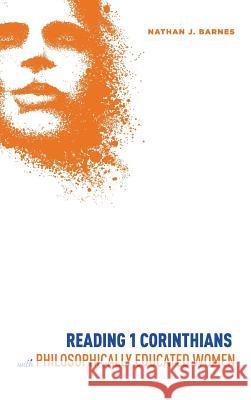Reading 1 Corinthians with Philosophically Educated Women » książka
Reading 1 Corinthians with Philosophically Educated Women
ISBN-13: 9781498265461 / Angielski / Twarda / 2014 / 356 str.
Reading 1 Corinthians with Philosophically Educated Women
ISBN-13: 9781498265461 / Angielski / Twarda / 2014 / 356 str.
(netto: 266,45 VAT: 5%)
Najniższa cena z 30 dni: 273,64
ok. 16-18 dni roboczych.
Darmowa dostawa!
Women were involved in every popular philosophy in the first century, and the participation of women reaches back to the Greek origins of these schools. Philosophers often taught their daughters, wives, and other friends the basic tenets of their thinking. The Isthmian games and a tolerance for independent thinking made Corinth an attractive place for philosophers to engage in dialogue and debate, further facilitating the philosophical education of women. The activity of philosophically educated women directly informs our understanding of 1 Corinthians when Paul uses concepts that also appear in popular moral philosophy. This book explores how philosophically educated women would interact with three such concepts: marriage and family, patronage, and self-sufficiency. ""Nathan Barnes insightfully explores how women with some philosophical education might engage Paul's 1 Corinthians. Barnes shifts the discussion beyond previous work in three important ways: in gender, from male author to women readers; in status, from lower ranks to more elite, educated readers; and from linguistic and thematic philosophical fragments to engagement with substantial text segments. A significant contribution."" --Warren Carter, Professor of New Testament, Brite Divinity School, Texas Christian University Nathan J. Barnes is a recent PhD graduate of Brite Divinity School. His current research interests include philosophical backgrounds in early Christianity and the New Testament.
Women were involved in every popular philosophy in the first century, and the participation of women reaches back to the Greek origins of these schools. Philosophers often taught their daughters, wives, and other friends the basic tenets of their thinking. The Isthmian games and a tolerance for independent thinking made Corinth an attractive place for philosophers to engage in dialogue and debate, further facilitating the philosophical education of women. The activity of philosophically educated women directly informs our understanding of 1 Corinthians when Paul uses concepts that also appear in popular moral philosophy. This book explores how philosophically educated women would interact with three such concepts: marriage and family, patronage, and self-sufficiency.""Nathan Barnes insightfully explores how women with some philosophical education might engage Pauls 1 Corinthians. Barnes shifts the discussion beyond previous work in three important ways: in gender, from male author to women readers; in status, from lower ranks to more elite, educated readers; and from linguistic and thematic philosophical fragments to engagement with substantial text segments. A significant contribution.""--Warren Carter, Professor of New Testament, Brite Divinity School, Texas Christian UniversityNathan J. Barnes is a recent PhD graduate of Brite Divinity School. His current research interests include philosophical backgrounds in early Christianity and the New Testament.











